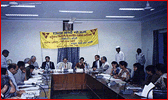District Action Plan
Decentralized planning and implementation of the RCH programme at the district level has been one of SIFPSA's successful interventions. District Action Plans (DAPs), being executed in ten districts in U.P. cover a population of 2.45 crore. Experience in these districts has shown that decentralization has led to:
- a need-based programme being developed
- increase in the involvement of stake holders
- quicker decision making
- flexibility in implementation and
- improved performance through integrated programmes
Five new DAPs were formulated after a series of workshops held from February 14 – 23, 2001 in Jhansi, Mirzapur, Moradabad, Shahjahanpur & Sitapur districts. The workshops followed a standard schedule of presentations on the district scenario and setting objectives for the next three years through participatory group work. Strategies to be adopted in each district were also evolved after group discussions. There was substantial representation and active participation from both, the field level - Medical Officers in Charge (MOICs), Dy. CMOs and NGOs as well as the decision makers – the Chief Medical Officer (CMO), Chief Development Officer (CDO), the District Magistrate and the Commissioner. This resulted in formulation of practical, need-based strategies and achievable goals for each district.
Successful strategies in the existing DAPs are being replicated in the new districts as well. New strategies like a measles vaccination campaign and an IEC campaign for sterilization would be common to all districts. However, district specific strategies have also been planned based on the local strengths and needs in each district. These are:

- Outreach health camps at sub centres
- IEC campaign to promote IUCD use
- Forging linkages with ICDS programme
- Project involving the Railways department
- improved performance through integrated programmes
- Involvement of self help groups
- Management of one government health centre (CHC) by an NGO
- Involving the Carpet Export Council in a project
- Orientation of religious leaders
- Team of medical officers for sterilization
- Assistance to private nursing homes
- Involvement of the postal network
- Male participation in FP using the network of barbers
- Involving Primary Agriculture Cooperative Societies (PACS)
- Improving service quality standards
The population covered by the five new DAPs will be 1.20 crore. Total population covered by fifteen DAPs will thus increase to 3.65 crore. As this has proved to be a successful intervention, rapid up-scaling of the DAPs to all 70 districts in the state is in the offing.
Other Links
UP 1995-2000
TFR in UP decreased from 4.8 in 1993 to 3.99 in 1999 — NFHS-1 & 2
CPR in SIFPSA NGO districts increased by 5.1% points from 1995 to 1999 compared to 0.7% points in other districts — USAID survey findings
Proportion of pregnant women covered by two doses of TT went up from 13% in 1999 to 59% in 2000 — PRC, Lucknow and ORG MARG
Get in Touch with us
(Uttar Pradesh), INDIA
E-Mail : info@sifpsa.org
Phone :(91 - 0522) 2630902,997,741,896,899,894
Fax :
Site Manage by : MARG Software Solutions
2016 © SIFPSA All Rights Reserved
Number of Visitors

